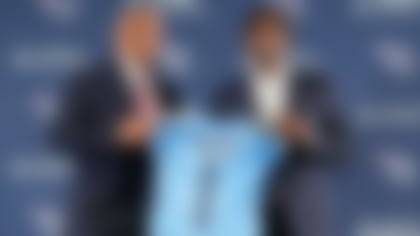NEW ORLEANS -- In the past two weeks, I've been able to travel to sunny locales and spend a considerable amount of time with men directly involved in the ongoing NFL labor unrest. As I prepare to return home from the NFL Annual Meeting in New Orleans, I do so with the distinct feeling that it is going to be quite some time before anything changes.
If left in this current state -- both sides entrenched in their positions, no mediation scheduled -- I can't imagine we get anything close to a speedy resolution to the issues that so separate owners and players. It seems to me that only direct intervention by Judge Susan Nelson on April 6 could expedite things, and unless she grants an injunction against the lockout, the NFLPA wins the appeal (at some later date) and the NFL is in essence forced to implement rules and open for business, then I tend to believe the spring will not hold much good news from a labor standpoint.
Weeks of mediation certainly created dialogue and some consensus on issues, and the process was productive, but it has not lessened many of the deep philosophical and financial divides that remain. Listening to executives and lawyers from both sides, it's impossible not to come away somewhat despondent about the short-term prognosis for a labor deal. I can't see it happening soon. Period.
Storylines from annual meeting
While labor unrest is the dominating storyline at the NFL's annual meeting, Pat Kirwan points out that there were other topics of conversation aside from the lockout. **More ...**
The talk, public and private, is still laced with rhetorical devices, both sides using certain buzzwords aimed at eliciting a visceral response in the opposing camp. Indeed, after a briefing by NFL officials in New Orleans to speak specifically about the league's legal arguments in the case of Brady v. the NFL, more than one person left the press conference room at The Roosevelt Hotel with the distinct impression about how entrenched the parties are, how compelling the lawyers believe their arguments are, and how long this battle might wage on.
The situation is now to the point where NFL officials were asked repeatedly about the possibility of using replacement players in 2011 -- it's not anything the league has yet considered, though legally it is an option open to them -- and Commissioner Roger Goodell faced several legitimate questions about the prospects for playing a full season, beginning in September.
Goodell said it is certainly the league's "intent and hope" to play a normal 2011 season. "The owners want to play a full season," he said. But no one could make any declarative statements or projections about that given where things stand right now, with the sides not talking and uncertainty continuing to color everything in regard to the football world.
A week of chatter about how perhaps the NFL and NFLPA might reconvene for legal counsel prior to the April 6 hearing became significantly overshadowed by the remarks from NFL officials that there would be no negotiating between lawyers from the sides without the NFLPA reforming as a union and abandoning it's claim to be a trade association. That, folks, is simply not going to happen, as decertification is central to the NFLPA's lawsuit and could end up being the most significant leverage point in this entire matter (if it holds up in court and/or through an investigation by the National Labor Relations Board).
"I can't see an end in sight," said a high-ranking official with one NFL club following the owner's meetings. "We don't really have an agreement in place on anything. Not on rookie compensation, not on offseason workouts. Not even the stuff we're supposedly 'close' on."
Whenever Judge Nelson makes a ruling on the injunction sometime in early April, the subsequent appeals could take months. Until there is some understanding about the ongoing validity of the decertification process, the NFLPA is not going to relinquish its claim that it no longer functions as a union.
Suspensions loom over illegal hits
The NFL Competition Committee revealed before the start of the NFL Annual Meeting it intends to crack down on repeat offenders of illegal helmet-to-helmet hits, writes Vic Carucci. **More ...**
So instead of proper negotiation or mediation, we get a back-and-forth about the motivations for Goodell sending a letter to every player in the league. We get debate about whether or not the NFLPA is or is not a union, and charged talk about that status. We get two sides saying essentially exactly contradictory things about the role of the NLRB in this mess.
I'd like to say that during private moments and public press conferences with key figures on both sides of this issue I found something to tell me that all of the inflammatory quotes and Tweets were a façade, that things really aren't this bad, that covertly some progress was being made or more understanding was being bridged. Nope. It is this bad, at least right now. When asked if he even had a phone call or some private exchange with NFLPA executive director DeMaurice Smith since talks broke down on April 11, Goodell said, "I have not."
If anything, the NFLPA Board of Player Representatives Meeting and the NFL Annual Meeting seem to have further entrenched both sides. Absent any meaningful exchanges between them, differences harden. The internal discussions and talking points seem to do more to reinforce what divides the sides and the diametrically different prisms they use to view the economics of the game. Even the players' cut of revenue under the former collective bargaining agreement has now become a subject for debate.
When surrounded by solely likeminded individuals, it becomes a bit more difficult to consider the opposing viewpoint. If this battle hasn't become personal between these sides, well, it certainly seems that way too (and to several level-headed people I spoke to from both camps).
When asked over the weekend about how the NFLPA's meeting might somehow generate some progress to a new deal, NFLPA executive board member Mike Vrabel conceded that at this point, absent real talks, that wouldn't be the case, and continued the group's demand for owners to open their books.
"These meetings won't make us help make progress toward a deal, because the men in that (NFLPA meeting) room can't provide the information that we need as an association to make a deal," Vrabel said. "But what it's doing is informing our player reps to be able to go out and share the message with the players of what's gone on the last two years more specifically than what went on in 15 days of mediation."
I don't know of anyone involved in the process who could reasonably predict a speedy resolution. With no true deadlines looming until August or possibly September, when games would truly hang in the balance, I fear that nothing short of court mandates will get these sides together.
Ask the experts
With many teams sporting a glaring need at QB, our team of experts debate which team should be more inclined to trade their backup QB: The Eagles or Packers? **More ...**
Quarterbacks on the move
The ability of the Philadelphia Eagles to actually consummate a deal involving quarterback Kevin Kolb remains on a most undetermined timetable, but that won't stop the chatter about his eventual trade. I've long maintained he would be dealt -- paying two quarterbacks starting money among other reasons -- and the value for Kolb likely remains right around the value of a late-first round pick.
The NFC West will be key in this scenario. Three of the teams in the division need a quarterback, and all three maintain at least some degree of interest in Kolb. The Seahawks and Cardinals, in particular, have shown a willingness to make big trades under current management, and Kolb would be a particular schematic fit offensively with the West Coast model of both teams.
One source with knowledge of the situation has a hunch that Kolb ends up in that division. That wouldn't surprise me at all. The Eagles know how to pull off these kinds of trades, and Andy Reid and Joe Banner have displayed a particular acumen in finding value in such deals over the years. Maybe a team comes out of nowhere to land Kolb (who had the Redskins in the McNabb office pool a year ago?), but I foresee at least one of these NFC West clubs offering at least a second-round pick that could increase to a first based on Kolb's future production.
From what I'm gathering, the Vikings are likely to end up on the periphery of the Kolb hunt, though I still can't help wondering if a former Eagles quarterback, Donovan McNabb, ends up being the guy who lands in Minnesota. There hasn't been much rumbling on the Kyle Orton trade front lately, but Matt Flynn could end up on the move if the price is right.
As for Carson Palmer, nothing has changed there. Bengals owner Mike Brown has reiterated his refusal to trade the disgruntled quarterback, and what he says goes. That's highly unlikely to change, with Palmer left to choose between retirement and earning $11.5 million from the Bengals in 2011.
Impact of new kickoff rules
Modifications to the kickoff rules were the focus of the Competition Committee's presentation to teams here, and while much of the media coverage focused on whether or not touchbacks would be moved to the 25-yard line, that was not the biggest concern for special teams coaches.
The special teams coaches I spoke to were most worried about the original proposal to eliminate the wedge entirely. With player safety as the genesis for the Competition Committee evaluating kickoffs in the first place, some coaches feared for the well being of their smaller, lighter return specialists without a wedge to protect them (ultimately the proposal passed, but with the two-man wedge still allowed).
"We need that damn wedge, now," said one special teams coach. "These little guys take some big hits. We need some type of protection for them. If we go one-on-one on the back end, there's going to be some big collisions. If you've got a little guy returning for you, he could really be vulnerable."
Special teams coaches were up in arms about the original changes to the wedge a few years back, and by all accounts have made astute adjustments. This particular part of the original proposal, however, might have been too extreme and ended up having the exact opposite of its desired impact.
Some have criticized the rule change as being "anti Hester" or "anti Cribbs," saying it will eliminate those players from the game. But the reality is, even if a third of all kickoffs do now go for touchbacks, many, many more will be returned. Not every kick will go to the end zone, and even those that do can still be returned.
It seems to me, if anything these rule changes will make the discrepancies between a truly great return man and the rest of the pack more significant and place even greater value on having a talent capable of fielding the ball two yards deep in the end zone and reversing field position or taking it to the house. Great return skills will remain in the demand ... but the days of kickoff specialists could well be over.
Follow Jason La Canfora on Twitter @jasonlacanfora.



